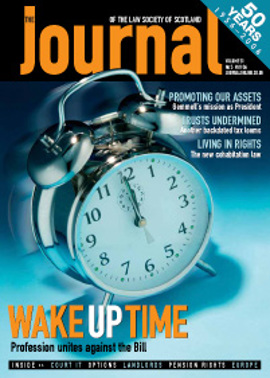Arguing over agreements

Amendment of pursuers’ name
In Link Housing Association Ltd v FBL Construction Ltd, 31 March 2006 Lord Wheatley allowed an amendment of the name of the pursuers to Link Group Ltd albeit it was after the time bar had expired. This was not an application to introduce an entirely different and unconnected party from the original litigant but rather to describe the true party accurately. The mistake initially made was not one of fundamental incompetence but an error in detail of no real significance. The basis of the action remained the same. No substantial prejudice had been suffered by the defenders.
Summary decree
In Pope v James McHugh Contracts Ltd 2006 GWD 7-119 Lord Carloway considered a motion for summary decree in an action for damages arising from the death of a father/husband. Although there was no defence to the merits, whether summary decree was granted was a matter within the discretion of the judge, the purpose of the remedy being to eliminate dilatory defences. Issues such as contributory negligence, apportionment and quantum still required proof in this case. Lord Carloway granted the motion so far as finding that the defenders were under an obligation to make reparation, but leaving the other issues to be determined at proof. In effect this resulted in the appropriate pleas in law being sustained and repelled. Such a result is sometimes overlooked but clearly can be of benefit and is worth bearing in mind when considering whether to enrol a motion for summary decree.
Remit to the sheriff court
In Drimsynie Estate Ltd v Ramsay 2006 GWD 10-182 Lord Brodie granted a motion to remit an action of declarator and removing relating to a holiday chalet to the sheriff court. Whilst his Lordship was initially attracted by the argument that the defenders, being individuals of modest means, would be exposed to greater expense if the action remained in the Court of Session, he ultimately rejected it as section 14 of the Law Reform (Miscellaneous Provisions) (Scotland) Act 1985 made reference to the “nature of the action” making a remit appropriate. This did not cover the parties’ financial circumstances. In reaching the decision to remit, his Lordship founded on the fact that the action was effectively an action for removing which would normally remain in the sheriff court. Further the action appeared straightforward and was relatively unimportant.
Settlement issues
An interesting practical reminder arises in Clark v Hope 2006 SCLR 98. After a motion to discharge the latest proof was refused, a document headed “Note by Counsel” and setting out terms of settlement was signed by counsel for both parties. As a result the proof did not proceed. A cheque was sent by the defenders in implementation of their obligation in terms of the document. A joint minute was not executed and a dispute arose as to whether settlement had been agreed. Lord Glennie had little difficulty in deciding that by counsel executing the document, settlement terms had been agreed. Settlements which fall within the ambit of an action are within the mandate of counsel. Counsel has the right to conduct a cause without regard to the client’s wishes and what is done bona fide according to counsel’s judgment will bind the client. Another practical point to arise from this case is that if settlement is effected on the day of the proof, it is worthwhile recording the agreement in some sort of document signed by the parties or their representatives, even though the consequences are not as conclusive if solicitors sign the document as is the position if counsel execute it.
Another interesting point of practical importance was considered by Sheriff Holligan in Stewart v Speed, Kirkcaldy Sheriff Court, 28 March 2006. The parties agreed the figure to settle a claim for reparation without an action being raised. However, the expenses could not be agreed and accordingly the pursuer raised an action. The defenders then lodged a document purporting to be a minute of tender, albeit stated “with such expenses as the court deems appropriate” and accordingly was not in proper form. Both parties sought expenses. The first observation which Sheriff Holligan made was that although from a drafting point of view it might appear illogical for a defender by tender to make an offer to pay expenses and then argue that in reality an award of expenses should be made in their favour, this result followed from the observations by Lord President Hope in McKenzie v H D Fraser & Sons Ltd 1990 SC 311 and the decision in Brackencroft Ltd v Silvers Marine Ltd 2006 SLT 85. In the present claim, the pursuer had no legal entitlement to legal expenses. When the claim was agreed at a particular figure, the pursuer’s claims were effectively exhausted. The action had been raised in reality to resolve the dispute as to extrajudicial expenses which should be paid by the defender’s insurers. Sheriff Holligan awarded the pursuer the expenses which the defender’s insurers had offered extrajudicially.
Family actions
In McLaren v Henderson, Dundee Sheriff Court, 1 March 2006, an action for contact had been dismissed as a result of the pursuer failing to appear at a child welfare hearing. The pursuer had been represented by his solicitor albeit he had failed to give instructions. Sheriff Principal Dunlop had little difficulty in allowing the appeal. Although the sheriff might have been able to justify dismissal on the basis of securing expeditious resolution of the dispute, this had not been the basis of the decision to dismiss the action. The sheriff principal followed the decision of Sheriff Principal Macphail in Samson v Fielding 2003 SLT (Sh Ct) 48 to the effect that the solicitor being present constituted representation. Further, notwithstanding the terms of OCR, rule 33.22A(5) requiring parties to attend such a hearing personally, when regard was had to the terms of rules 16.2 and 33.37 failure of a party to attend such a hearing could not be construed as constituting failure to attend a diet. The remedy is to seek an interlocutor ordaining the absent party to attend a subsequent hearing. Failure to do so would constitute default in terms of rule 33.37(1)(b). Sheriff Principal Dunlop further makes observations (paragraph 7) as to the adequacy of the submissions by the respondent’s solicitor at appeal. It is a point validly made.
Caution for violent profits
In Ashford and Thistle Securities LLP v Kerr, Edinburgh Sheriff Court, 28 February 2006, Sheriff Principal Bowen concluded that a motion for violent profits was incompetent in actions for extraordinary removing. As the term of the lease had not come to an end, the tenant could not be said to be in violent possession. This applies even although the pursuers had been granted decree which was subject to appeal. The terms of OCR, rule 34.5 did not alter the position previously expressed in the decisions of Mackays v James Deas and Son Ltd 1977 SLT (Sh Ct) 10 and Imperial Hotel Glasgow Ltd v Brown 1990 SCLR 86.
Appeals
Whilst an interlocutor which is pronounced “of consent” cannot be appealed, if an interlocutor is not pronounced “of consent” but is subsequently acquiesced in, this does not bar the party who acquiesced in the terms of the interlocutor appealing. This was decided in Slessor v Vetco Gray UK Ltd 2006 GWD 11-199 by the Inner House. Thus the party was able to argue a point at the appeal which was not taken before the court at first instance.
Expenses
Although the particular points are clearly special to the facts of the case, the decision by Lord Carloway in Jarvie v Greater Glasgow Primary Care NHS Trust, 15 March 2006 is worth noting if problems are experienced at taxation. Perhaps the area of expenses has become such a specialised area with the sums being significant that solicitors often delegate any problems to law accountants. Nonetheless the observations by his Lordship on points such as counsel’s fees for consultations, for the proof (both preparation and for being committed to the proof), and the cancellation fees for experts are worthy of a look, particularly if you experience such problems.
The issue of whether the terms of the rule of court relating to abandonment prevented the court deciding that the basis of taxation could be other than party/party was considered by Lord Mackay in Lord Advocate v ASAU JV, 24 March 2006. Both the Court of Session and the ordinary cause rule refer to “full judicial expenses”. His Lordship decided that it would be perfectly competent for him to pronounce an interlocutor whereby the expenses could be taxed on a basis other than party/party. However, in the circumstances, he did not consider that it had been demonstrated that the defenders had acted unreasonably, recklessly, or in bad faith thus justifying such an order.
Whether expenses should be ordered to be taxed on the basis of the solicitor and client scale was again at issue in McKie v The Scottish Ministers, 30 March 2006. The circumstances of that case are very special and I do not think that anything of general guidance can really be gleaned from the decision of Lord Hodge, who like Lord Mackay concluded that the pursuer had failed to demonstrate that the defenders had acted unreasonably, recklessly, or in bad faith.
The decision of Sheriff Pyle in Mackenzie v Ryan, 2006 GWD 10-191 is worthy of note in that it is a rare example of a judgment on the issue of sanction for counsel. The basis of the motion was fourfold: the pursuer’s solicitor was a general practitioner from rural practice; the defender’s solicitor was a specialist litigator in a large commercial law firm; the defender’s solicitor was a solicitor advocate; the defender’s motion was so inept, the pursuer’s solicitor decided he and not the defender’s solicitor was wrong. He accordingly instructed counsel.
Sheriff Pyle refused the motion. The test to be satisfied was whether the litigation was sufficiently difficult, complex, important or of sufficient value. The points put forward by the pursuer in no way met these factors. The fact that one party is represented by counsel or a solicitor advocate is by itself of no relevance. The last factor, whilst it might have the ring of truth, was not one to transform a simple issue into one of complexity!
Antisocial behaviour orders
In City of Edinburgh Council v Gibson, Edinburgh Sheriff Court, 31 March 2006 Sheriff Principal Bowen indicated as a matter of principle that an interim antisocial behaviour order could be granted in circumstances in which the behaviour complained of was prohibited by an interim interdict. The former granted the power of immediate detention in the event of breach and could be advantageous.
The usual caveat applies.
In this issue
- Stand up to be counted
- A bill to divide us
- The pendulum swings
- The pendulum swings (1)
- Cohabitation: the new legal landscape
- The tax man cometh (again)
- The foreign legion
- Making IT happen
- Apportioning and sharing
- Property problems
- Still a profession
- Arguing over agreements
- Next generation law
- Lawyers in the transfer market
- Scottish Solicitors' Discipline Tribunal
- Landlords: setting the mark
- Website review
- Book reviews
- Purchase options in leases






